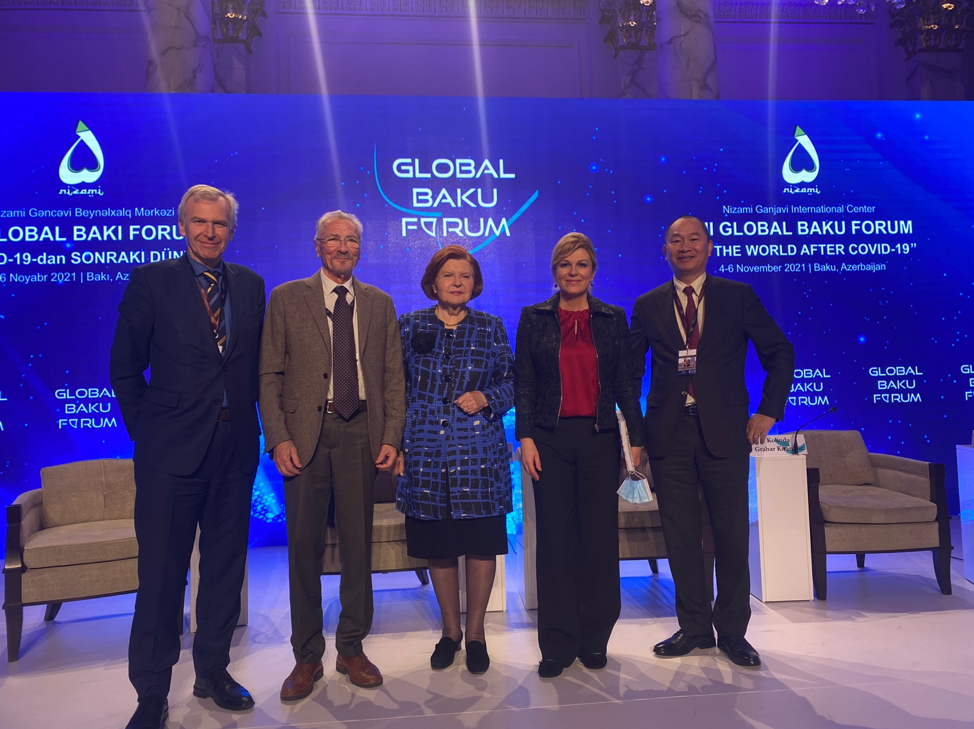
by Editor | Nov 7, 2021 | News
On November 6, 2021, Mr. Nguyen Anh Tuan, co-founder and CEO of the Boston Global Forum, spoke at the Panel “Future of EU on the Global Stage” together with panelists Kolinda Grabar-Kitarovic, President of Croatia 2015-2020, Yves Leterme, Prime Minister of Belgium 2008, 2009-2011, Emil Constantinescu, President of Romania 1996-2000, moderated by Vaira Vike-Freiberga, President of Latvia 1999-2007; Co-Chair, NGIC. Mr. Nguyen Anh Tuan contributed ideas in maintaining the role and position of EU in the Age of AI and Digital, below are his key messages:
- EU can lead in building an Age of Global Enlightenment
- Europe was the major contributor to the Enlightenment in the 18th century.
- Today with AI, Digital, and Blockchain, the world needs a new model for politics, society, and economy based on democratic values and standards.
- The EU can play a leading role in collaboration with the US to make the Age of Global Enlightenment – Smart Democracy.
- In 2020, BGF created the Social Contract for the AI Age.
- The Social Contract for the AI Age is the fundamentals and standards for international relations and of the Age of Global Enlightenment.
- Relations with the US, Russia, and China are defined on standards of the Social Contract for the AI Age
- EU can lead to Global Alliance for Digital Governance
- Building and leading Global Alliance for Digital Governance.
- The first step: EU lead in solving misinformation, disinformation, and global enlightenment education.
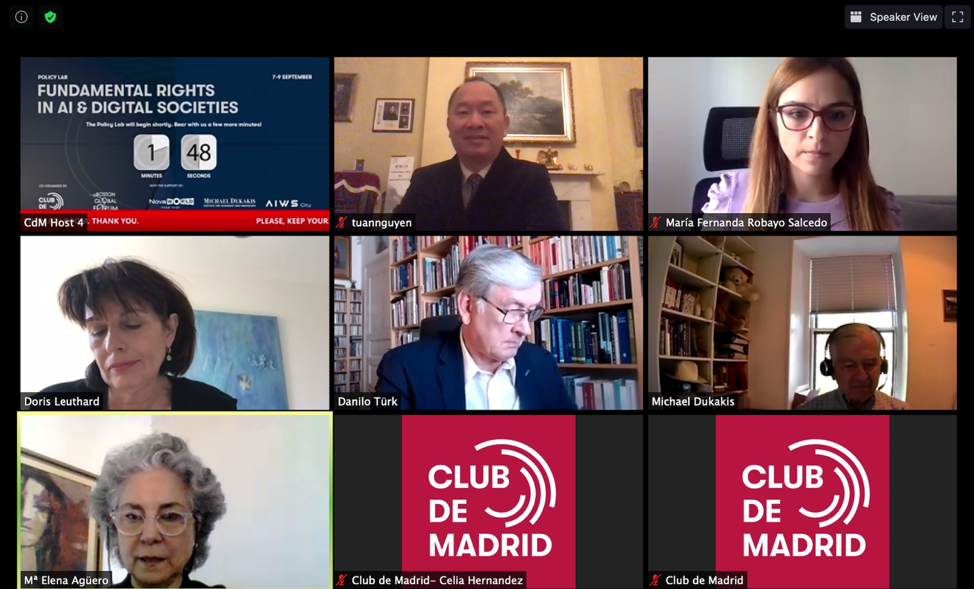
by Editor | Nov 7, 2021 | News
- There is no doubt that digital technologies, and AI, in particular, have, for better or for worse, generated a revolution for fundamental rights. Building an international agreement on digital governance has complexities and the global policy and geopolitical environment plays a key role in facilitating or limiting the construction of this agreement.
- Common democratic values such as respect and promotion of human rights, and the rule of law are crucial to underpinning digital policy as an essential starting point to move towards that agreement.
- Challenges such as AI and data governance that domestic frameworks cannot address alone are crucial points on which we must focus. From there, we can start with small but important steps to build a culture of agreement on digital issues – _with a premium on the Transatlantic space, that has the advantage of shared values.
- In a field where so much is yet to come, we are convinced that international cooperation for Artificial Intelligence and digital technologies is an opportunity to write the rules together. The Framework for AI International Accord, a part of the e-book “Remaking the World – Toward an Age of Global Enlightenment”, presented at this Policy Lab is a significant start for this goal.
- We need some internationally agreed fundamental rules or norms to guide the development of technologies; we cannot anticipate to protect rights we do not fully comprehend; and the efforts that already exist are essential to continue working on the objective that gathered us these three days. It will be a challenging process, because of the variety of values and approaches that are emerging in different parts of the world, but there is common ground to be found. And to that end, making principles operational and integrating a variety of stakeholders representing countries and communities in all their diversity, including inter-generational differences is needed.
- Many of the issues discussed intersect with the crucial work the UN is both doing and planning to do, under the leadership of Secretary-General Guterres, to maintain international peace and security, and support the achievement of the SDGs. AI, cybersecurity, diplomacy, and development – _not least social development – _all relate to defense and promotion of fundamental rights in the digital sphere. It is our aim that our recommendations, the United Nations Centennial Initiative, and the book “Remaking the World – Toward an Age of Global Enlightenment” support ‘Our Common Agenda’ and, particularly, the Global Digital Compact proposal.
- There is no lack of goodwill and effort to build an AI framework on which different actors – governments, local governments, and non-government actors can agree. The UNESCO Recommendation on the Ethics of Artificial Intelligence is a promising step in the right direction.
- We have also established a Global Alliance for Digital Governance that includes relevant stakeholders -governments, private sector, academia, civil society, international organizations- to reduce the digital field’s development gaps and bring communities together, thus contributing to the United Nations Centennial Initiative.
- We agreed on the need for a new social contract that takes digital transformation into account. To build a social contract suited for the digital age, going beyond traditional allies and reach out to those who think differently is crucial. The Social Contract for the AI Age is a recognized tool and will be fundamental for the Age of Global Enlightenment.
- Throughout this process of reflection, trust is essential and to obtain that we would need to build on security, privacy, reliability and fairness as crucial pillars that will promote digital technologies as a tool to serve inclusive societies.
- Protecting access to information, education and digital literacy and finding a balance between freedom of speech and the imperative to have a common truth will allow progress on drafting common rules on AI. In this regard, the AIWS City will be a practical model for addressing this issue.
- It is tough to craft legislation and rules for technologies that are not yet being used, so we need a risk-based approach to digital governance. In the case of AI, this approach will help to elaborate some of the requirements for its design, development and application phases.
- Ex ante and ex-post regulation are not incompatible. We need both to better govern digital. Ex ante regulation will allow institutions to provide guardrails for rights, including data rights, in the deployment of AI systems. Ex post regulation will allow AI systems to be audited. In this regard, we agreed accountability is a fundamental consideration in the deployment of AI technologies. We need to be able to explain how AI systems reach the decisions they reach and will allow us to work to stop the dynamics of discrimination, exclusion and inequalities that are being replicated and amplified by AI technologies. The Global Alliance for Digital Governance can be a significant movement for this mission.
- The Community Innovation Economy concept was introduced during the Policy Lab as a tool that empowers citizens to create value for themselves, for others, and for society through the application of AI, digital, block chain, and data science technologies. It is a sharing ecosystem that rewards both the creators and users of these technologies, as well as an ecosystem that encourages everyone to innovate.
- Despite the existing gaps in the regulation of digital technologies and their use, they have been fundamental tools of resilience during the COVID-19 pandemic and we must not forget their benefits.
- Finally, we would like to mention that many of the discussions of the six Plenaries highlighted the significant contributions of the e-book, “Remaking the World – Toward an Age of Global Enlightenment”, published by the UN Centennial Initiative and the Boston Global Forum.
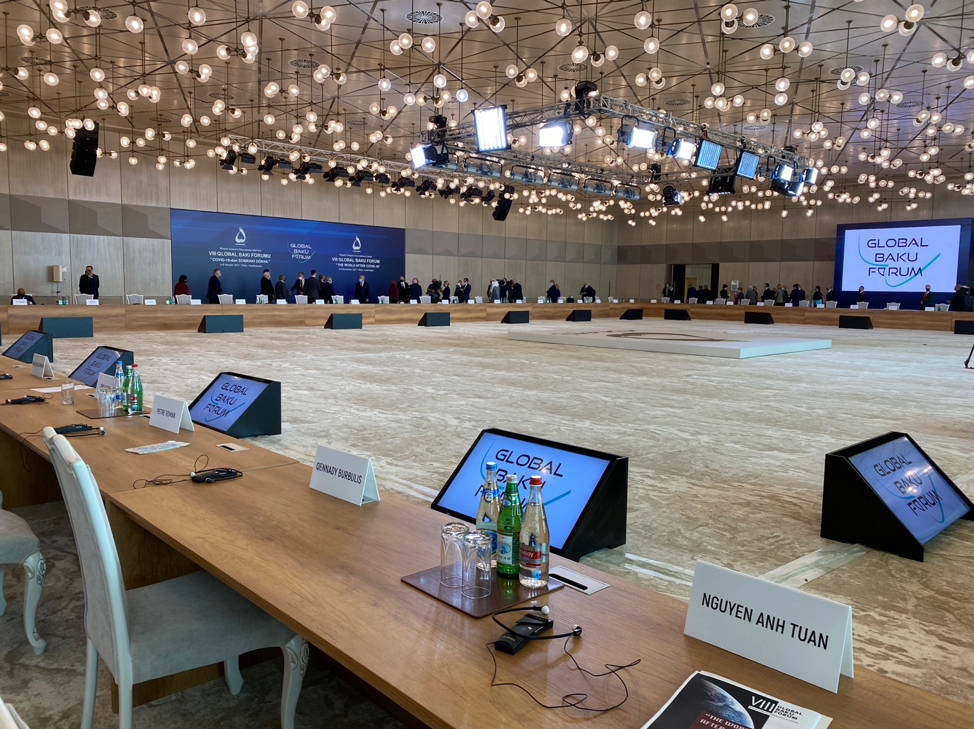
by Editor | Nov 7, 2021 | Global Alliance for Digital Governance, Global Law and Accord on AI and Digital, News
With more than 40 presidents, prime ministers and distinguished leaders and thinkers, under a 3-day agenda, the Global Baku Forum was hosted on November 4-6, 2021.
The Social Contract for the AI Age was recommended as a standard for international relation.
Here are some participants from the Global Baku Forum:
Ilham Aliyev, President of the Republic of Azerbaijan
Milo Dukanovic, President of Montenegro
Sefik Dzaferovic, Member of the Presidency of Bosnia & Herzegovina
Egils Levits, President of the Republic of Latvia
Nathalia Gavrilita, Prime Minister of Moldova
Mohammad Shtayyeh, Prime Minister of the State of Palestine
His Holiness Pope Francis, Head of Catholic Church and sovereign of Vatican City State
Tatiana Valovaya, Director-General, United Nations Office at Geneva
Miguel Angel Moratinos, UN High Representative for the Alliance of Civilizations
Tedros Adhanom Ghebreyesus, Director-General, World Health Organization
Vaira Vike-Freiberga, Co-Chair, NGIC; President of Latvia 1999-2007
Ismail Serageldin, Co-Chair, NGIC; Vice President of the World Bank 1992-2000
Tarja Halonen, President of Finland 2000-2012
Ivo Josipovic, President of Croatia 2010-2015
Zlatko Lagumdzija, Prime Minister of Bosnia and Herzegovina 2001-2002; deputy Prime Minister of Bosnia and Herzegovina 2012-2015
Yves Leterme, Prime Minister of Belgium 2008, 2009-2011
Gordon Brown, Prime Minister of the UK 2007-2010
Ehud Barak, Prime Minister of Israel 1999-2001
Helen Clark, Prime Minister of New Zealand 1999-2008
Emil Constantinescu, President of Romania 1996-2000
Chiril Gaburici, Prime Minister of Moldova 2015
Ameenah Gurib-Fakim, President of Mauritius 2015-2018
Dalia Itzik, President of Israel 2007, President of Knesset 2006-2009
Gjorge Ivanov, President of North Macedonia 2009-2019
Mladen Ivanic, President of Bosnia and Herzegovina 2014-2018
Jan Fischer, Prime Minister of the Czech Republic 2009-2010
Kolinda Grabar-Kitarovic, President of Croatia 2015-2020
Petru Lucinschi, President of Moldova 1997-2001
Igor Luksic, Prime Minister of Montenegro 2010-2012
Moussa Mara, Prime Minister of Mali 2014-2015
Stjepan Mesic, President of Croatia 2000-2010
Festus Mogae, President of Botswana 1998-2008; Special Envoy of the United Nations Secretary-General on Climate Change
Petre Roman, Prime Minister of Romania 1989-1991
Rosalia Arteago, Serrano President of Ecuador 1997
Laimdota Straujuma, Prime Minister of Latvia 2014-2016
Danilo Turk, President of Slovenia 2007-2012
Viktor Yushchenko, President of Ukraine 2005-2010
Binali Yildirim, Prime Minister of Turkey 2016-2018; Speaker of the Grand National Assembly 2018-2019
Valdis Zatlers, President of Latvia 2007-2011
Amre Moussa Secretary-General, Arab League 2001-2011; Minister of Foreign Affairs of Egypt 1991-2001
Rosen Plevneliev, President of Bulgaria 2012-2017
Petar Stoyanov, President of Bulgaria 1997-2002
Boris Tadic, President of Serbia 2004-2012
Filip Vujanovic, President of Montenegro 2003-2018
Eka Tkeshelashvili, Deputy Prime Minister of Georgia 2010-2012
Kateryna Yushchenko, First Lady of Ukraine 2005-2010
Ana Birchall, Deputy Prime Minister of Romania 2018-2019; Minister of Justice 2019; Member of the Parliament of Romania
Gennady Burbulis, First Deputy Prime Minister to the Russian Federation 1991-1992, State Secretary
Cemil Chichek, Deputy Prime Minister of Turkey 2007-2011; Speaker of the Grand National Assembly 2011-2015
Volkan Bozkır, President of the 75th UN General Assembly; Minister of European Union Affairs of the Republic of Turkey 2015-2016
Mats Karlsson, Former Vice-President of the World Bank
Ouided Bouchamaoui, Nobel Peace Prize Laureate 2015
Nguyen Anh Tuan, Co-founder and CEO of the Boston Global Forum, the Editor of the book “Remaking the World – Toward an Age of Global Enlightenment”.
Link https://www.youtube.com/watch?v=Ulbgl_FmJzI
Boston Global Forum is a partner of NGIC.
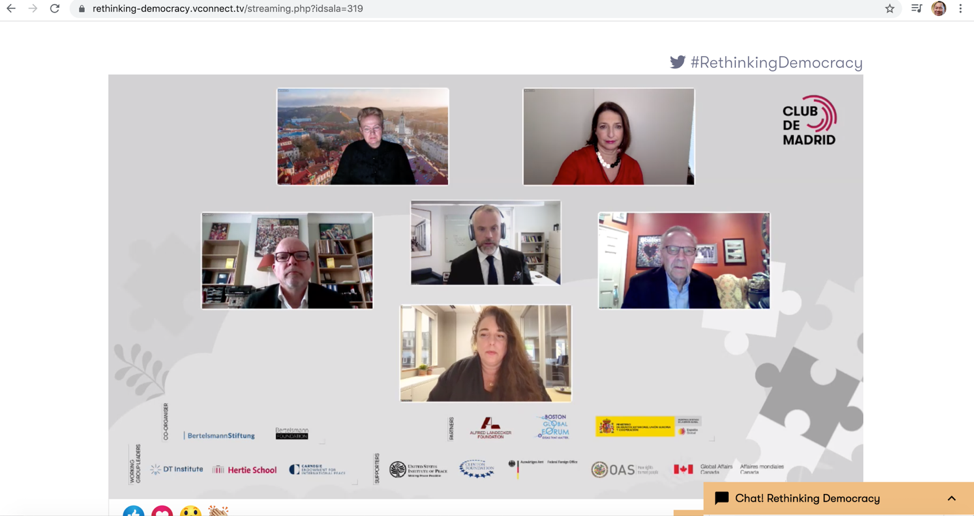
by Editor | Oct 31, 2021 | News
Club de Madrid’s members contributed to Remaking the World – Toward an Age of Global Enlightenment, making them distinguished leaders of Global Enlightenment Community in AIWS City.
We introduced some significant ideas of speakers at the Policy Dialog “Rethinking Democracy” organized by Club de Madrid in partnership with Boston Global Forum on October 27-29, 2021.
Regarding the continued support of international financial institutions towards increasingly autocratic states such as Nicaragua, Laura Chinchilla, Vice President of Club de Madrid and former President of Costa Rica stated: “International Financial Institutions must stop focusing only on the macro- economic and start looking at human rights”.
The former President of Costa Rica warned that international and regional organisations must act sooner when faced with a crisis of democracy. “If we operate under the logic that everything is fine, until everything is wrong, we end up with situations such as that of Nicaragua”, Chinchilla added.
Zsuzsanna Szelényi, Member of the Hungarian Parliament (2014-2018), explained the recent concerted effort by the Hungarian opposition to defeat Viktor Orban in the upcoming national election. Parties were able to come together and elect a single candidate by leveraging technology and digital activism. “Everything was online, as the public media was captured by the government. We now have the result, a candidate, who is a charismatic newcomer”, Szelényi said.
As a result of this experience, Szelényi concludes that “technology can deeply and strongly support democratic innovation”, but “it wouldn’t have worked without people first, coming out to the streets, and activists organising from behind”.
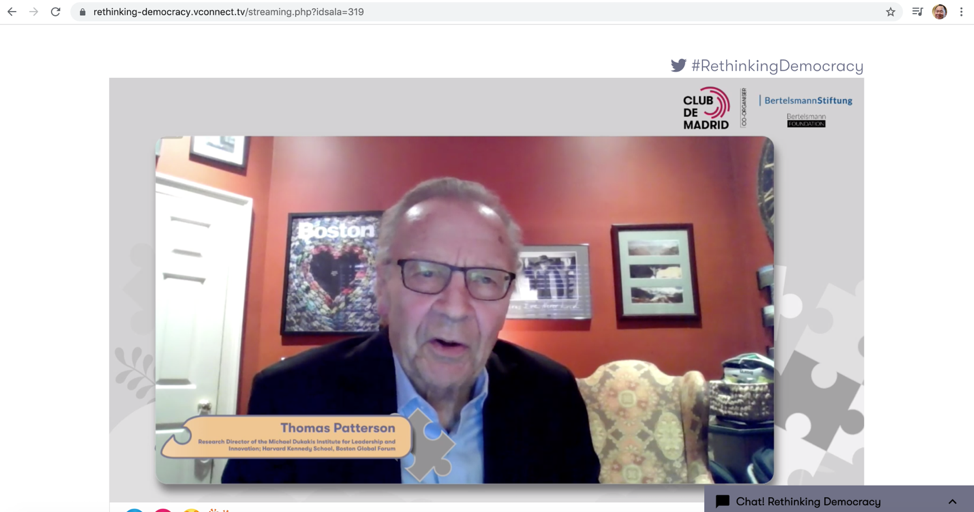
by Editor | Oct 31, 2021 | News
Speaking at Club de Madrid’s Policy Dialog “Rethinking Democracy” on October 27, 2021, Professor Thomas Patterson, Harvard University, co-founder of the Boston Global Forum, Distinguished Contributor of Remaking the World – Toward an Age of Global Enlightenment, highlighted the Social Contract for the AI Age and concepts in the book as fundamentals for democracy in the digital era.
Aleksander Kwasniewski, former President of Poland, claimed that “after the collapse of the USSR, we thought that ‘the End of History’ was here but China offers a real alternative that for many is more appealing than democracy. In China we have a real competitor”.
In this line, Derek Mitchell, President of the National Democratic Institute, urged that “We need to understand how China works at home and abroad”. At the same time, he stated that the decline in the quality of democracy “is a practical challenge, not a theoretical one. We need to ensure democracy delivers”.
Democracy is no longer a matter of voting every 4 years and then exercising a mandate until the next election. “We need new schemes of representation, a more liquid democracy”, said Former PM of Belgium Yves Leterme.
Former PM of the Netherlands Jan Peter Balkenende, emphasised democratic culture: “Democracy is not the majority winning and dominating, but rather the majority taking care of the minority”.
Former Vice President of Costa Rica Casas-Zamora also encouraged democratic innovation in terms of representation: “The basic setups of democracy have been around for 100 years. It is time to rethink it. It is time to be bold, embrace innovation and reform. We need to come up with new institutions and new types of deliberation”.
Speakers demanded of the upcoming Democracy Summit convened by U.S. President, Joe Biden, to make a categorical defence of democracy. Activists expressed the need for democracies to become more proactive in defending such systems internally and externally.
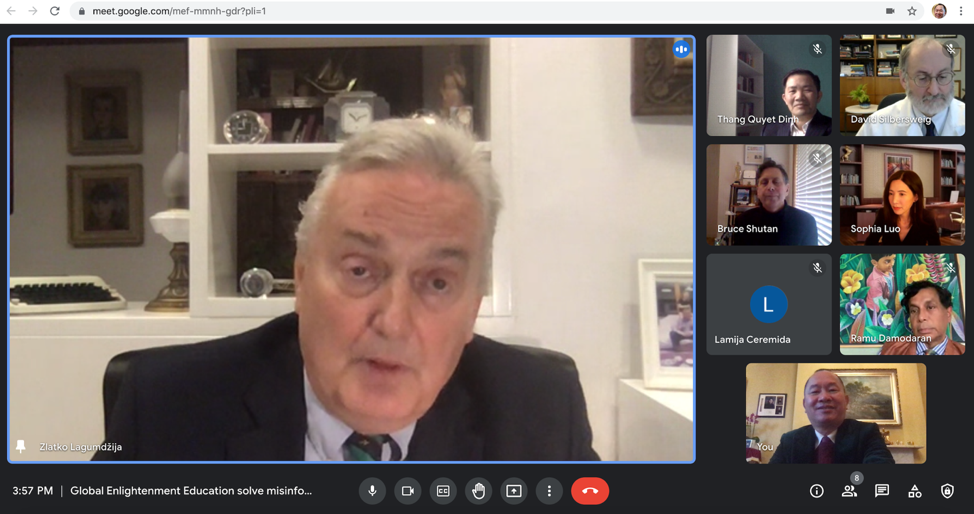
by Editor | Oct 31, 2021 | News
On October 28, 2021, to promote and support UNESCO Media and Information Literacy Week, Boston Global Forum organized the Roundtable “Global Enlightenment Education solve misinformation and disinformation”. Mr. Ramu Damodaran, the first Chief of United Nations Academic Impact and Co-Chair of the United Nations Centennial Initiative, was the moderator of the Roundtable.
Prime Minister Zlatko Lagumdzija, member of Club de Madrid, one of Coordinators of Global Alliance for Digital Governance raised:
In last two years, Boston Global Forum and Club de Madrid, and UN Academic Impact as well, collaborated especially in the context of putting together the Social Contract for the AI Age, putting efforts together as an alliance of like-minded people and entities to do something that will cause to get artificial intelligence, an issue of artificial intelligence, closer to what the purpose of every technology is supposed to be, which is, basically speaking, for progress and prosperity of the human being.
In that context, Boston Global Forum participated a lot in Club de Madrid Policy Dialogue that was dealing with an issue of we think in major topics of democracy.
To solve disinformation and misinformation practically, we build the new information ecosystem that has to be built as a result of the technological developments and prospects of democracy that we want to build.
Professor David Silbersweig, Harvard University, Board Member of Global Enlightenment Education Program, introduced the Global Enlightenment Education Program as an important part of AI World Society and the United Nations Centennial Initiative, and said:
The increased powers that technology gives it and the increased powers of the nation states and bad actors are small groups and the vulnerability of the population to mass manipulation on a scale and with an acceleration that is enabled by the technology so the solutions need to be technologically enabled and need to be informed by our latest understanding.
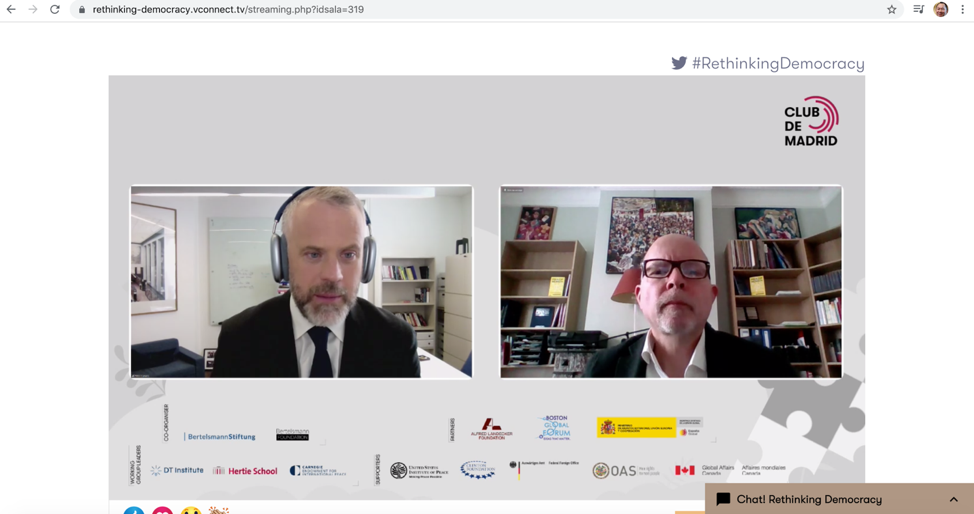
by Editor | Oct 31, 2021 | News
Distinguished Contributors of Remaking the World – Toward an Age of Global Enlightenment and Coordinators of Global Alliance for Digital Governance Paul Nemitz and Professor Thomas Patterson spoke at the Policy Dialog 2021. They brought ideas from discussions in building Global Law and Accord on AI and Digital.
“Technology, well-framed with legal instruments, will be conducive to democracy. We found that with radio -used by Nazis first, then regulated and a factor for democracy, and with TV). TV and Radio needed rules to be good for democracy. It’s time to do it with the internet and AI”, said Paul Nemitz, Principal Advisor, Directorate-General for Justice and Consumers at the European Commission.
Participants reflected on the nature and potential development of democracy, its institutions and mechanisms. “You need a state, rule of law and democracy. And we need to find a balance between state and individual freedom. We also need a system in which a majority cannot impose its will on a minority”, said Alexander Stubb, the former Prime Minister of Finland.
Ricardo Lagos, former president of Chile, noted how politics today are “much more horizontal” thanks to platforms and technologies by which politicians are able to directly communicate with citizens. “Politicians could have more established institutions to listen to the people and learn their demands”, he said.
Anna-Lena von Hodenburg, the CEO of HateAid, said that leaving platforms to self-regulate does not work to address the floods of disinformation and hate speech online driving polarisation. We need balanced regulation instead. Von Hodenburg called for more rights for users and transparency from platforms.
Regarding new information technologies, Derek Mitchell, President of National Democratic Institute stated that “The digital will kill democracy. Our inability to fight the disinformation battle is daunting. Without a strong information basis to build consensus, democracy cannot succeed”.’
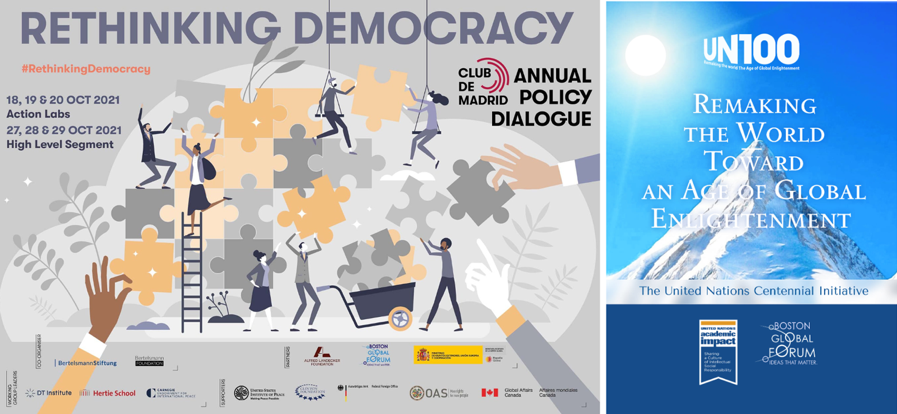
by Editor | Oct 31, 2021 | Event Updates
Boston Global Forum partnered with Club de Madrid in organizing the Policy Dialog “Rethinking Democracy”
CdM again partnered with the Boston Global Forum, its renowned scholars and the Global Alliance for Digital Governance, which serve to coordinate distinguished leaders, strategists, thinkers, and innovators, the creation of a Global Law and Accord on AI and Digital, and contribute concepts for mechanisms with strong enforcement potentials.
In the Opening Remarks at the Policy Dialog 2021, President of CdM Danilo Turk stressed:
“In a field where so much is yet to come, we are convinced that international cooperation for Artificial Intelligence and digital technologies is an opportunity to write the rules together. The Framework for AI International Accord, a part of the Book “Remaking the World – Toward an Age of Global Enlightenment”, presented at CdM-BGF Policy Lab September 2021 is a significant start for this goal.”
In the Policy Dialog, Gordon Brown, the former Prime Minister of the United Kingdom highlighted nationalism as a key ideology distorting democratic governance. “People need to work together to solve problems. If we fail to do so, democracy suffers. One ill of democracy we can’t ignore is that we are facing political nationalism, which is a dominant ideology today”, Brown added.
Laura Chinchilla, former president of Costa Ricca, said that education is the number one factor shaping a generation of democratic citizens. “Educating people on democratic values can really make a difference. We should emphasise civic education in our solutions”, Chinchilla stated. Likewise, Gordon Brown highlighted a growing individualism in citizens’ perception of democratic rights: “There is a missed connection that your rights depend on other people having rights as well”, said the former Prime Minister.
“Democracy is also about prosperity. People need to eat. Supporting elections is not enough to defend democracy nowadays” said Emma Jeblaoui, the President of the International Institute in Human Development. Regarding the experience in Tunisia, Jeblaoui expressed that “democracy support is not only about giving money. It’s also about following up on the reforms and not only sending a cheque and visiting once a year for a group photo.”
Concluding of the 3-days of rich and wide discussions of the Policy Dialog 2021: To succeed in the global fight against authoritarianism, democracies are required to ensure that information ecosystems support safe, healthy, and fully functioning societies. Citizens and public interest should be at the core of all decision‐making.
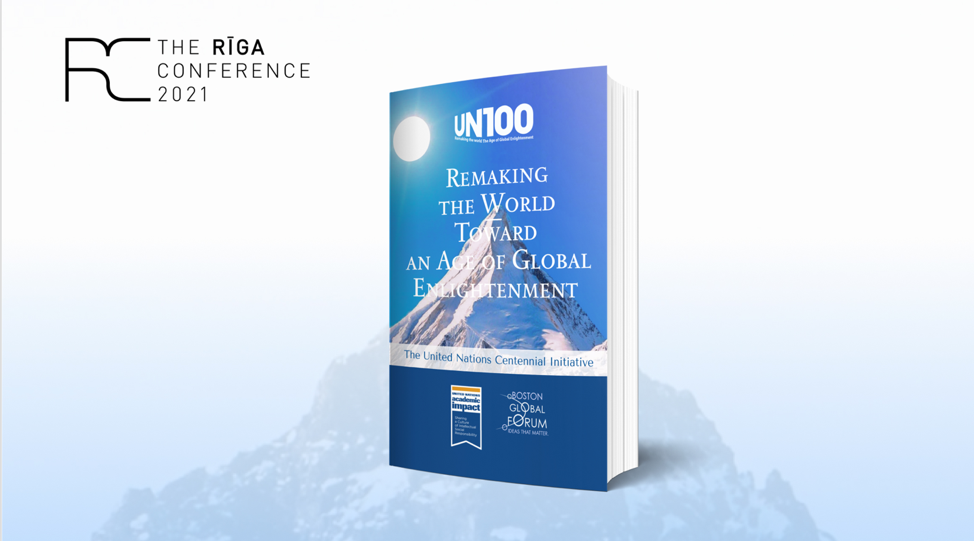
by Editor | Oct 24, 2021 | News
Ramu Damodaran, the first Chief of United Nations Academic Impact (2010-2021), Co-Chair of the United Nations Centennial Initiative
In a phrase later paraphrased by, and hence often misattributed to, Dag Hammarskjold, Henry Cabot Lodge said of the then new United Nations that it would not “bring us to heaven, but might save us from hell.” As we observe the organization’s 76th anniversary on October 24, perceptions of both hell and heaven have become more proximate, the impact of the pandemic, or personal escape from it, a measuring rod, shaping also the ecumenical “Our Common Agenda” authored by UN Secretary-General Antonio Guterres last month as a moral, as much as political, compass for our common future.
Drawing upon rich sources, including a global conversation launched in 2020 that aggregated responses from 1.5 million people, the report builds upon Guterres’s determination that the 75th anniversary of the United Nations be opportunity to shape the future rather than celebrate the past, an idea that informed the Boston Global Forum’s own United Nations Centennial Initiative, looking at how the world would be in 2045, the moment the Organization reached a hundred years. Central to both the “Common Agenda” and our effort is the imperative of a new social contract, one Guterres defines as “between governments and their people and within societies so as to rebuild trust and embrace a comprehensive vision of human rights”, and one which we, in the specific context of our age of artificial intelligence (AI), see based upon “dialogue, tolerance, learning and understanding on key principles and practices for an agreement among members of society for shared social benefit.”
We see the shape of such agreement leading to the United Nations extending international human rights standards to AI (contributing to the “comprehensive vision” Guterres suggests), adopting a convention on the use of AI and establishing a specialized UN agency on AI. We have at least two precedents to draw upon, including the very first resolution adopted by the United Nations General Assembly, Resolution 1/1 of January 1946.
The four months between the signing of the UN Charter by its original members, on June 26,1945, and the formal launch of the Organization, on October 24, were punctuated by an event unforeseen when the Charter was drafted, the use of atomic weapons in August. That inspired the resolution “to deal with the problems raised by the discovery of atomic energy” and its creation of the UN Atomic Energy Commission with an objective to use atomic energy only for peaceful purposes. While there were certainly infirmities and evasions in the resolution, including the placement of the Commission under the authority of the Security Council rather than General Assembly, and its dissolution within a few years, it did set the pace for the International Atomic Energy Agency to emerge and, more immediately, the Treaty on the Prohibition of Nuclear Weapons which entered into force for its signatories in February this year.
A second precedent is the Organization for the Prohibition of Chemical Weapons (OPCW), charged with the implementation of the Chemical Weapons Convention with its unique provision for on-site inspections of operational chemical weapons destruction facilities as well as “challenge” inspections of use or production of chemical weapons alleged, with provision of verifiable proof, by one or more States against another. Worth noting is that although it has a working relationship with the United Nations, OPCW is not itself a UN body.
Both a Social Contract for the AI age and an alliance or compact for digital governance can be fashioned by nations within the forums of the United Nations or outside, as the precedents of IAEA and OPCW show. Our preference, given the leadership of the Secretary-General, would be the former; it is odd that, in 2021, matters relating to AI are dispersed among UN entities as disparate as its Conference on Disarmament, its Inter-regional Crime and Justice Research Institute and the International Telecommunications Union. Sound and swift multilateral action can inspire creative academic, scientific and civil society endeavors, including the emergence of an AI “World Society” (AIWS) and of AIWS Cities, urban centers for innovation and reflection, both of which we suggest in our own report.
As we repair our world and our lives, the moment is opportune. As Derek Walcott, the Nobel literature laureate who taught at Boston University for a number of years reminded us, when you “break a vase, the love that reassembles the fragments is stronger than that love which took its symmetry for granted when it was whole.” Let’s seize that strength.










